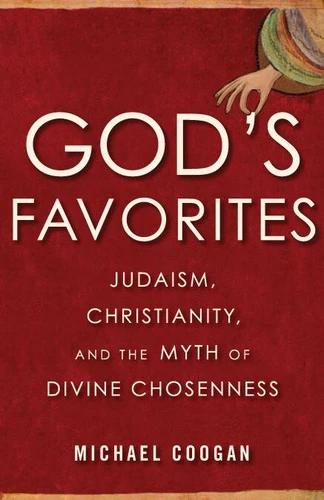God's Favorites. Judaism, Christianity, and the Myth of Divine Chosenness
Par :Formats :
Disponible dans votre compte client Decitre ou Furet du Nord dès validation de votre commande. Le format ePub protégé est :
- Compatible avec une lecture sur My Vivlio (smartphone, tablette, ordinateur)
- Compatible avec une lecture sur liseuses Vivlio
- Pour les liseuses autres que Vivlio, vous devez utiliser le logiciel Adobe Digital Edition. Non compatible avec la lecture sur les liseuses Kindle, Remarkable et Sony
- Non compatible avec un achat hors France métropolitaine
 , qui est-ce ?
, qui est-ce ?Notre partenaire de plateforme de lecture numérique où vous retrouverez l'ensemble de vos ebooks gratuitement
Pour en savoir plus sur nos ebooks, consultez notre aide en ligne ici
- Nombre de pages176
- FormatePub
- ISBN978-0-8070-0195-0
- EAN9780807001950
- Date de parution02/04/2019
- Protection num.Adobe DRM
- Taille2 Mo
- Infos supplémentairesepub
- ÉditeurBeacon Press
Résumé
A noted biblical scholar explores how the claim of divine choice has been used from ancient times to the present to justify territorial expansion and prejudice. The Bible describes many individuals and groups as specially chosen by God. But does God choose at all? Michael Coogan explains the temporally layered and allusive storytelling of biblical texts and describes the world of the ancient Near East from which it emerged, laying bare the power struggles, the acts of vengeance, and persecutions made sacred by claims of chosenness.
Jumping forward to more modern contexts, Coogan reminds us how the self-designation of the Puritan colonizers of New England as God's new Israel eventually morphed, in the United States, into the self-justifying doctrines of manifest destiny and American exceptionalism. In contemporary Israel, both fundamentalist Zionists and their evangelical American partners cite the Jews' status as God's chosen people as justification for taking land-for very different ends.
Appropriated uncritically, the Bible has thus been used to reinforce exclusivity and superiority, with new myths based on old myths. Finally, in place of the pernicious idea of chosenness, Coogan suggests we might instead focus on another key biblical concept: taking care of the immigrant and the refugee, reminding the reader of the unusual focus on the vulnerable in both the Hebrew Bible and New Testament.
Jumping forward to more modern contexts, Coogan reminds us how the self-designation of the Puritan colonizers of New England as God's new Israel eventually morphed, in the United States, into the self-justifying doctrines of manifest destiny and American exceptionalism. In contemporary Israel, both fundamentalist Zionists and their evangelical American partners cite the Jews' status as God's chosen people as justification for taking land-for very different ends.
Appropriated uncritically, the Bible has thus been used to reinforce exclusivity and superiority, with new myths based on old myths. Finally, in place of the pernicious idea of chosenness, Coogan suggests we might instead focus on another key biblical concept: taking care of the immigrant and the refugee, reminding the reader of the unusual focus on the vulnerable in both the Hebrew Bible and New Testament.
A noted biblical scholar explores how the claim of divine choice has been used from ancient times to the present to justify territorial expansion and prejudice. The Bible describes many individuals and groups as specially chosen by God. But does God choose at all? Michael Coogan explains the temporally layered and allusive storytelling of biblical texts and describes the world of the ancient Near East from which it emerged, laying bare the power struggles, the acts of vengeance, and persecutions made sacred by claims of chosenness.
Jumping forward to more modern contexts, Coogan reminds us how the self-designation of the Puritan colonizers of New England as God's new Israel eventually morphed, in the United States, into the self-justifying doctrines of manifest destiny and American exceptionalism. In contemporary Israel, both fundamentalist Zionists and their evangelical American partners cite the Jews' status as God's chosen people as justification for taking land-for very different ends.
Appropriated uncritically, the Bible has thus been used to reinforce exclusivity and superiority, with new myths based on old myths. Finally, in place of the pernicious idea of chosenness, Coogan suggests we might instead focus on another key biblical concept: taking care of the immigrant and the refugee, reminding the reader of the unusual focus on the vulnerable in both the Hebrew Bible and New Testament.
Jumping forward to more modern contexts, Coogan reminds us how the self-designation of the Puritan colonizers of New England as God's new Israel eventually morphed, in the United States, into the self-justifying doctrines of manifest destiny and American exceptionalism. In contemporary Israel, both fundamentalist Zionists and their evangelical American partners cite the Jews' status as God's chosen people as justification for taking land-for very different ends.
Appropriated uncritically, the Bible has thus been used to reinforce exclusivity and superiority, with new myths based on old myths. Finally, in place of the pernicious idea of chosenness, Coogan suggests we might instead focus on another key biblical concept: taking care of the immigrant and the refugee, reminding the reader of the unusual focus on the vulnerable in both the Hebrew Bible and New Testament.



